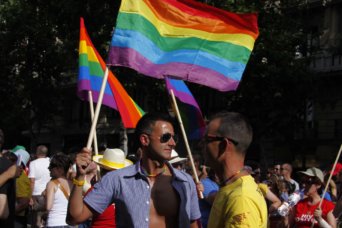- About
- Topics
- Picks
- Audio
- Story
- In-Depth
- Opinion
- News
- Donate
-
Signup for our newsletterOur Editors' Best Picks.Send
Read, Debate: Engage.
This week hundreds of cities around the world are holding demonstrations in support of the rights of the LGBTI community (Lesbian, Gay, Bisexual, Transsexual and Intersex). The largest concentration of LGBTI activists is anticipated in Madrid, World Pride capital in 2017, where two million visitors are expected. The date is significant, since this year Spain celebrates the 40th anniversary of the first Gay Pride demonstration celebrated in the country, a march that took place in 1977 in Barcelona, when the country was under the transition process towards democracy.
This year, the mayor of the Spanish capital welcomes LGBT activists with a rainbow flag installed on the main balcony of the mayor’s headquarters, which joins other initiatives to celebrate World Pride, such as gay friendly traffic lights, which depict same sex couples.
In the last four decades, much progress has been made in Spain and the world in terms of rights for LGTB people. However, many rights are still widely denied in several countries. To be LGBT is punished by law in about eighty countries and in seven of them (such as Saudi Arabia, Iran or Mauritania) it’s still penalised with the death penalty. In other countries, such as Turkey, there have been setbacks in this area. This week, LGBT activists demanded President Erdogan that a march went ahead despite being banned by the authorities for the second consecutive year. The demonstration in Istanbul was violently repressed by the police, with arrests made and tear gas used.
Moreover, at the same time, in countries considered advanced due to strict legislation that favours equal rights regardless of sexual orientation, homophobic abuse nevertheless continues to prevail. Last week shocking footage was shown on the Spanish news and social media as several members of a far-right group tried to assault participants in a march during Gay Pride celebrations in Murcia.
Although the situation has been steadily improving globally in recent decades and many steps have been taken in the right direction, we are still far from reaching full equality and the absence of discrimination. Thus, it is the essential for citizenship participation to be active and mobilised to pressurise governments to putting more effort into achieving social equality.
